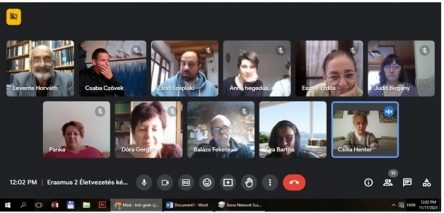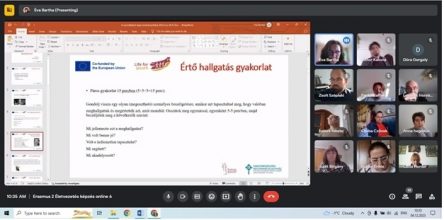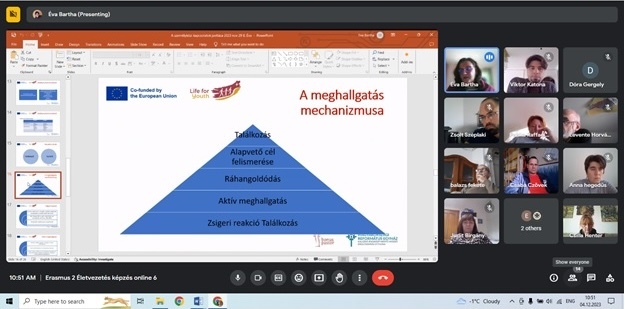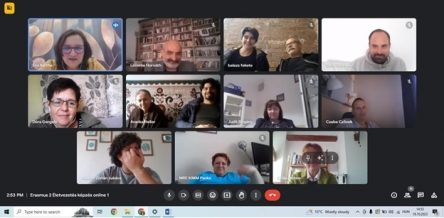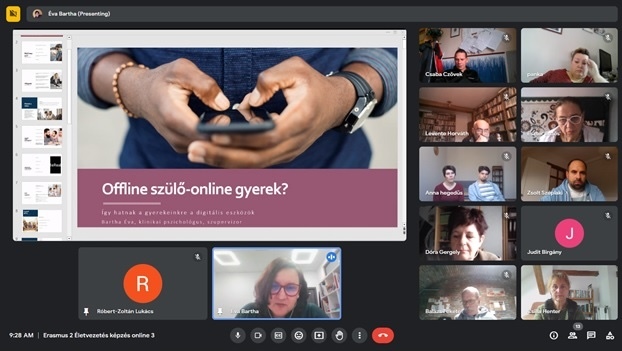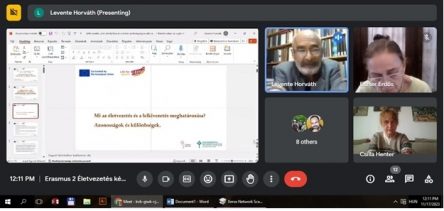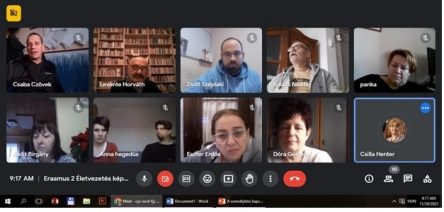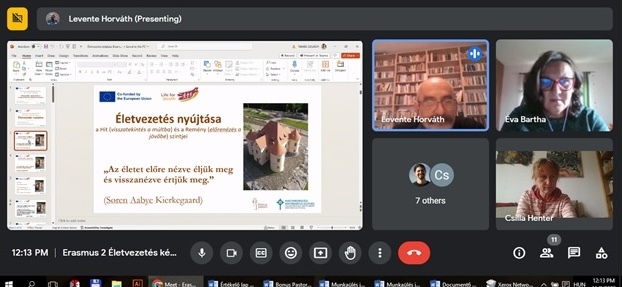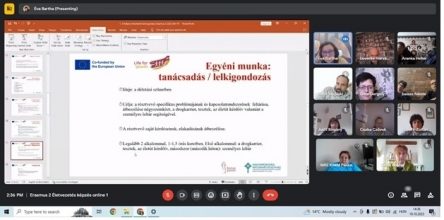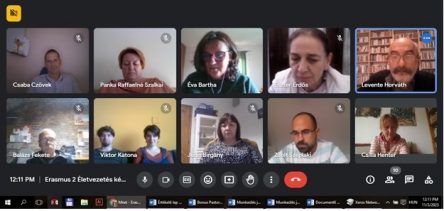Erasmus + – Life for Youth – Online Professional Training – Târgu-Mureș | Romania

Life for Youth
2022-3-RO01-KA210-YOU-000098044
Life Coaching for Young People
Online Professional Training
Târgu-Mureș, Romania
19. 10. 2023 – 04. 12. 2023
Summary
The in-person professional training held in Târgu Mureș from September 14-19, 2023, was
followed by six additional online sessions, each lasting five hours. These sessions aimed to
offer further support in the practical application of the acquired knowledge, addressing
questions that arose during the testing phase, and providing answers to challenges
encountered when using the methods. Participants also shared and worked through case
studies together.
The first online training session, was held on October the 19th , 2023, focused on Supporting
Self-Awareness in Brief Therapy Programs and was led by clinical psychologist Éva Bartha.
She emphasized how the support for self-awareness has evolved in the context of brief
therapy programs over the past 30 years, especially in identifying substance and behavioral
dependencies in users and their families. The session introduced and discussed competencies
that could be applied in prevention activities, such as the Johari Window model, the “self and
others” perspective, recognizing introverted and extroverted dimensions of one’s personality,
gaining insights into family relationship patterns, raising awareness about relapse, and
developing problem-solving competencies.
The second training, held on November the 3rd , 2023, was led by Dr. Levente Horváth and
addressed Life Coaching for Young People. Life coaching for youth is a form of counseling
that supports young people in navigating the challenges of adolescence and the transitions
between different stages of life. Life coaches collaborate with clients together to set goals,
boost self-confidence, discover life purpose, enhance decision-making skills, and establish a
clear sense of direction. Life coaching is an important tool in drug prevention. This session
covered areas such as building resilience, setting positive goals, improving decision-making,
strengthening self-esteem, developing communication skills, identifying triggers and
underlying issues, as well as enhancing responsibility and support. Elements of contextual
family therapy were introduced as well, which can be effectively integrated into life coaching,
including identifying family patterns, improving communication, managing family conflicts,
fostering supportive environments, strengthening parents, identifying triggers and stressors,
involving the family, and offering preventive education.
The third session, was held on November the14th , 2023, and it was conducted by clinical
psychologist and supervisor Éva Bartha. She discussed Correcting Family Relationships, with
a special focus on preventing online addictions. The session explored factors contributing to
online addiction and discussed various digital device use-related disorders, such as FOMO
(Fear of Missing Out), JOMO (Joy of Missing Out), FOBO (Fear of Being Offline),
Nomophobia (No Mobile Phone Phobia), Phantom Vibration Syndrome, and Sharenting
(Sharing and Parenting). The impact of these issues was discussed, as well as provided
practical tips for parents and teachers, and introduced reasonable limitations regarding digital
media use. Participants had the opportunity to develop their empathy and sensitivity towards
parents, as well as their ability to offer emotional guidance. The participants were eager to
absorb and process any new information and discuss how topics related to digital media could
be integrated into rehabilitation programs, like through workshops or seminars. The
professionals actively contributed by sharing their own experiences and discussing the topics
raised.
On November the 17th , 2023, Dr. Levente Horváth began his session by defining Spiritual
Guidance and comparing it to life coaching, highlighting their similarities and differences. He
then introduced Motivational Interviewing (MI) as a counseling approach, particularly useful
in prevention. The key characteristics of MI include empathy, close collaboration,
highlighting contradictions (ambivalence), strengthening self-efficacy, reinforcing information
to trigger “change talk,” de-escalating “resistance talk,” reflective listening, and asking
evocative questions. MI helps therapists to connect with clients, build commitment, uncover
internal ambivalence, increase motivation, assess willingness to change, set realistic goals,
improve problem-solving and decision-making skills, support autonomy, provide feedback,
and reinforce positive changes. This session focused on enhancing social skills, spirituality,
and communication competencies.
The fifth training, held on November the 29th , 2023, was led by Éva Bartha and focused on
Improving Interpersonal Relationships. For helping professionals, the creation of a
therapeutic relationship is crucial, as it models a healthy relationship pattern for young people
who are at risk of substance abuse. The session discussed fundamental needs for healthy
adulthood, such as self-awareness, the ability to build intimate and quality relationships, and
the creation of motivating goals, cultivating an “I can do this” mindset. The session developed
participants’ active listening skills and presented prevention tools, such as the importance of
mutual evaluation and acceptance, the role of close friendships and romantic relationships,
effective communication, and conflict management techniques. Participants were open to
discussing the topic, sharing their personal experiences, and exploring new professional
questions related to substance abuse.
The sixth and final training, held on December the 4th, 2023, focused on Problem-Solving,
Conflict Management, and Self-Control in Lifestyle. During this session, Éva Bartha identified
behavior patterns related to competitiveness, problem-solving, avoidance, adaptation, and
compromise-seeking attitudes. Recognizing these attitudes can help in problem-solving and
conflict managment. The session covered coping strategies and explored self-restraint through
practical exercises. This workshop aimed to develop participants’ communication skills,
problem recognition, problem-solving capabilities, and self-awareness in managing conflicts.
During the session, participants requested a discussion about the differences and overlaps
between the roles of mentors, therapeutic workers, and psychologists. Additionally, the group
discussed practicing Motivational Interviewing and the possibility of future collaboration
through joint projects.
